Expecting a baby is an exciting and transformative time, but it also comes with the responsibility of ensuring maternal and fetal health. Incorporating the best supplement for pregnancy into your daily routine is essential for meeting the increased nutrient demands during this period. This article will detail the importance of prenatal vitamins, focusing on key nutrients like folic acid, iron, vitamin D, and omega-3 fatty acids, which play crucial roles in fetal development and maternal health. Understanding the benefits and selecting the right prenatal vitamin can significantly impact your pregnancy.
Different prenatal vitamins, such as tablets, gummies, softgels, and liquids, offer various benefits tailored to individual preferences and needs. We will explore these options to help you choose the best fit for your lifestyle. Additionally, it goes without saying that consulting a healthcare provider is crucial for personalizing your supplement plan, ensuring safe and effective intake, and making necessary adjustments throughout your pregnancy to address specific deficiencies and health conditions. Read on to learn how to keep you and your baby healthy with the right prenatal vitamins and safe supplement practices.
Key Takeaways
- Prenatal vitamins are essential for meeting the increased nutrient demands during pregnancy, with key nutrients like folic acid, iron, vitamin D, and omega-3 fatty acids playing crucial roles in fetal development and maternal health.
- Different forms of prenatal vitamins, such as tablets, gummies, softgels, and liquids, offer various benefits, and choosing the right form depends on individual preferences and needs.
- Consulting a healthcare provider is crucial for personalizing supplement plans, ensuring safe and effective supplement intake, and making necessary adjustments throughout pregnancy to address specific deficiencies and health conditions.
Essential Nutrients for a Healthy Pregnancy

A healthy pregnancy demands a variety of essential nutrients to support the mother and the developing baby. These nutrients include:
- Folic acid
- Iron
- Vitamin D
- Omega-3 fatty acids
All play critical roles in ensuring proper development and preventing deficiencies. Each nutrient offers unique benefits, from preventing neural tube defects to promoting strong bone development and supporting brain health.
It is key to grasping the significance of these nutrients and learning how to integrate them into your diet by eating healthy foods or supplement regimens.
Folic Acid
Folic acid is a powerhouse nutrient that holds immense significance during pregnancy. It is vital for developing the baby’s spinal cord and brain, reducing the risk of serious neural tube defects like spina bifida and other neural tube defect instances. Folic acid is crucial in DNA synthesis, red blood cell production, and overall fetal development. Given its importance, many prenatal vitamins contain folic acid to ensure optimal neural tube development, making a folic acid supplement an essential part of prenatal care.
To support early fetal development, it’s recommended that women begin taking folic acid supplements before conception. The recommended daily intake is 400 mcg, which can be easily met through most prenatal vitamins. Foods rich in folate, such as:
- green leafy vegetables
- citrus fruits
- beans and legumes
- fortified cereals and breads
can also contribute to your daily intake, but supplementation consistently ensures you meet the required levels.
Iron
Iron is another key nutrient during pregnancy due to its vital role in producing hemoglobin - the protein in red blood cells responsible for oxygen transportation to tissues. Pregnant women need almost double the amount of iron compared to nonpregnant women due to an increase in blood volume by 45%. This increased blood volume supports the mother and the developing fetus, making iron supplements essential.
The recommended daily intake of iron during pregnancy is 27 milligrams. Iron supplements help meet this increased need, preventing iron deficiency anemia, which can lead to complications such as preterm birth and low birth weight. Iron-rich foods like red meat, beans, spinach, and iron supplements ensure adequate iron levels. Additionally, pairing iron supplements with vitamin C-rich foods like citrus fruits can enhance iron absorption.
Vitamin D
Vitamin D, fundamental for a healthy pregnancy, plays a primary role in calcium absorption for the baby’s bone and teeth development. Pregnant women often face the risk of vitamin D deficiency, which can lead to complications like preeclampsia, preterm birth, and gestational diabetes. Therefore, taking a vitamin D supplement during pregnancy is highly recommended to ensure maternal and fetal bone health.
The benefits of vitamin D extend beyond bone health. Adequate vitamin D levels are linked to a reduced risk of cesarean section and other pregnancy complications. Pregnant women should consult their healthcare providers to screen for vitamin D deficiency and determine the appropriate dosage of vitamin D supplements. Including vitamin D-rich foods like fatty fish can also help maintain sufficient levels.
Omega-3 Fatty Acids
DHA, a variety of omega-3 fatty acids, plays a vital role in the baby’s brain development and eyes. It is essential for their growth and overall well-being. These fatty acids play a significant role in overall pregnancy health, contributing to the baby’s cognitive and visual development. Prenatal vitamins often include DHA to ensure pregnant women receive adequate amounts of this critical nutrient.
Sources of omega-3 fatty acids include fatty fish like salmon and supplements like Nordic Naturals Prenatal DHA, which provide a substantial amount of DHA and EPA per serving. Including these in your diet or as part of your prenatal vitamins can significantly benefit maternal and fetal health.
For our vegan or vegetarian readers, check out our article “Five of the Best Vegan Omega-3 Supplements You Need to Know.”This article provides valuable information on quality omega-3 products derived from non-fish sources, ensuring you receive all the necessary nutrients without compromising your dietary preferences.
Choosing the Best Prenatal Vitamins

Choosing the right prenatal vitamins is key to fulfilling the heightened micronutrient demands during pregnancy. It is important to start taking prenatal vitamins, as they should contain higher amounts of essential nutrients like folic acid, iron, and iodine to support the mother and the developing baby.
Considering the various forms of prenatal vitamins available, including tablets, gummies, and softgels, will help you find the one that suits your needs best.
Key Ingredients
In the selection process of prenatal vitamins, prioritize those with higher levels of essential nutrients such as:
- Folic acid: crucial for preventing neural tube defects
- Iron: supports increased blood volume and prevents anemia
- DHA: an omega-3 fatty acid vital for fetal brain development and overall pregnancy health
Prenatal vitamins like Nature Made and Olly The Essential Prenatal Gummy Multivitamin are excellent choices because they include these essential nutrients.
It’s also important to check for other key ingredients like calcium and vitamin D, which support the development of the baby’s teeth and bones. Some prenatal vitamins, like Thorne Research, lack DHA so you may need an additional DHA supplement. So, Thorne may be the ideal choice for those who want to use a vegan source of DHA. Always ensure that the prenatal vitamins you choose are manufactured in a GMP-certified facility for quality assurance.
Forms of Prenatal Vitamins
Prenatal vitamins are available in diverse forms, including:
- Tablets, such as New Chapter Advanced Perfect Prenatal Multivitamins, are popular for their comprehensive nutrient delivery but may be harder to stomach for some women.
- Gummies, like Vitafusion Prenatal Gummies, are easier to consume but may lack certain minerals like iron and calcium.
- Softgels are easy to swallow and absorb quickly.
- Liquids can be mixed with water or juice for easier consumption.
Each form of prenatal vitamin has its unique advantages and drawbacks. Choosing the best form for you is important, and consulting your healthcare provider for personalized recommendations is essential.
Softgels and liquids offer alternative options that might be gentler on the stomach and easier to swallow. When choosing the form of your prenatal vitamin, consider what will be easiest for you to take consistently. This ensures you receive all the vital nutrients needed for a healthy pregnancy.
Multivitamins vs. Individual Supplements
The decision between prenatal multivitamins and individual supplements can pose a challenge. Multivitamins offer a comprehensive solution by including a broad range of essential nutrients needed during pregnancy, helping to cover nutritional gaps and reducing the need for multiple individual supplements.
However, there are situations where dietary supplements might be necessary to address specific deficiencies in an individual’s diet.
Benefits of Multivitamins
Prenatal multivitamins:
- Simplify daily nutrient intake by combining multiple essential nutrients into one pill
- Help fill dietary gaps
- Ensure the mother and baby receive adequate nutrients for overall health and development.
This comprehensive approach to a healthy diet reduces the complexity of managing multiple supplements and helps maintain consistent nutrient intake during pregnancy.
When Individual Supplements are Necessary
Individual supplements might be necessary if a blood test reveals specific nutrient deficiencies not fully addressed by a prenatal multivitamin. For example, if a pregnant woman has low iron levels, additional iron supplements may be required to prevent anemia. Women who opt for gummy prenatal vitamins might also need extra supplements for minerals like calcium and iron, which are often excluded from gummies.
It’s important to consult with a healthcare provider before taking additional supplements to ensure they are necessary and safe. Personalized supplement plans based on individual health profiles and dietary needs can help address specific deficiencies and ensure optimal nutrient levels throughout pregnancy.
Safe and Unsafe Supplements During Pregnancy

Discerning between safe and unsafe supplements during pregnancy is vital to guarantee proper nourishment and mitigate risks. Some supplements are beneficial and safe, while others can pose significant dangers to the mother and baby. Understanding the difference can help make informed decisions about supplement intake during pregnancy.
Safe Supplements
Safe supplements during pregnancy include:
- Magnesium, which can help prevent chronic hypertension and premature labor
- Ginger, which is effective for treating pregnancy-induced nausea and vomiting
- Probiotics are generally safe and may reduce the risk of gestational diabetes and other complications.
Including these safe supplements can support a healthy pregnancy and ensure the mother's and baby's well-being.
Unsafe Supplements
Some supplements can be dangerous during pregnancy and should be avoided. Here are a few examples:
- Black cohosh and dong quai have the potential to stimulate uterine contractions, which can increase the risk of miscarriage. It is important to use caution when using these herbs, especially during pregnancy.
- Yohimbe has been associated with high blood pressure, heart attacks, and seizures, making it unsafe for pregnant women.
- Goldenseal contains berberine, which can worsen jaundice in infants and should also be avoided.
Additionally, taking too much vitamin A can lead to liver damage, toxic effects, and birth defects. It’s important to avoid excessive doses of vitamin A and stick to the amounts found in prenatal vitamins. Approximately 15.4 percent of pregnant women in the United States use herbal supplements, but it’s crucial to be cautious and consult a healthcare provider before taking any new supplements during pregnancy.
How to Incorporate Supplements into Your Daily Routine
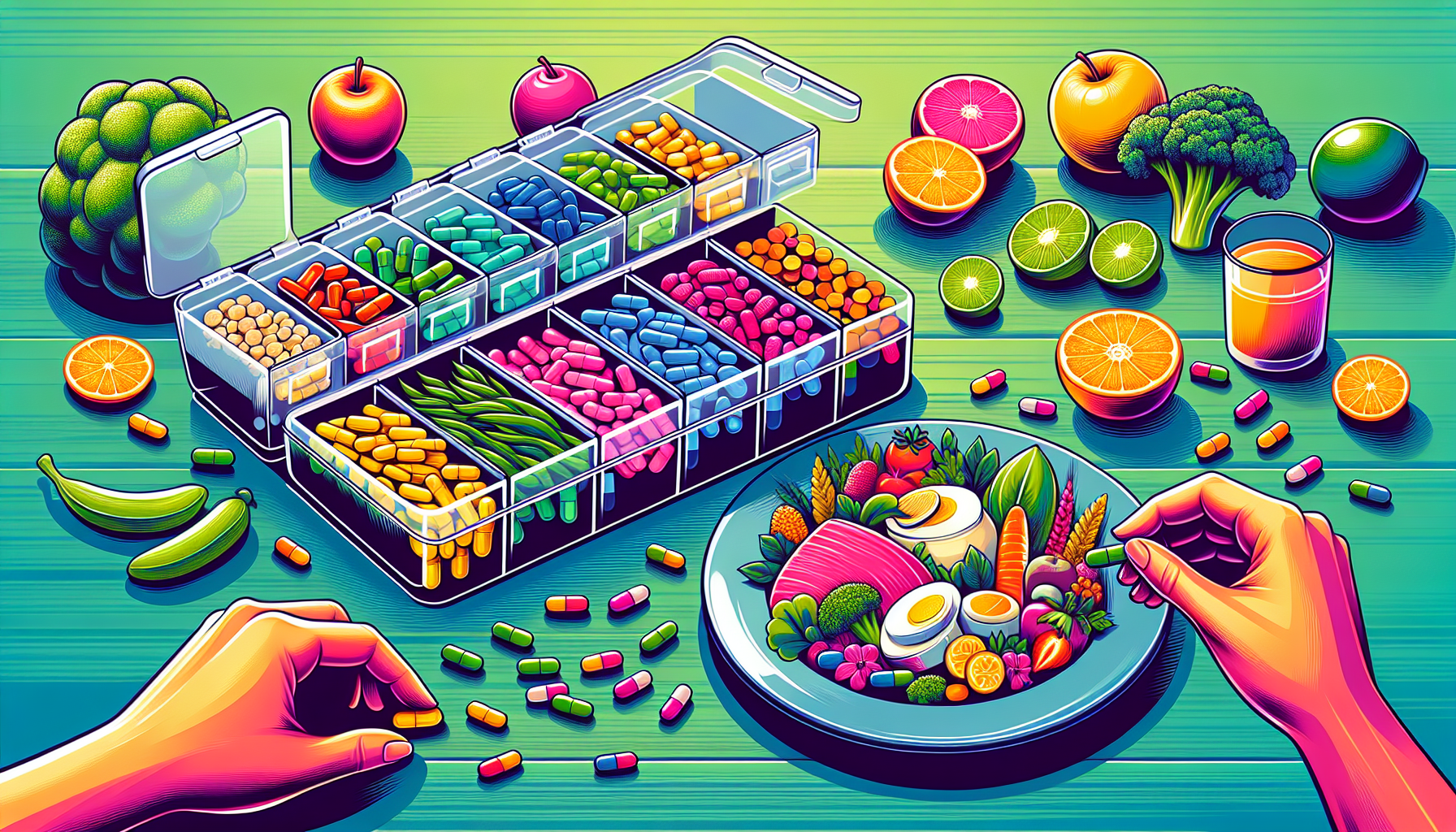
Including supplements in your daily regimen aids in maintaining consistent intake and maximizing their benefits. Here are some effective strategies to make this process easier and more efficient:
- Establish a routine for taking your supplements.
- Use a pill organizer to keep track of your daily doses.
- Pair your supplement intake with a balanced diet to enhance their effectiveness.
By following these strategies, you can ensure you get the most out of your supplements.
Timing and Dosage
To optimize absorption, prenatal vitamins are best taken on an empty stomach, preferably 1 hour before or 2 hours after meals. Drinking a full glass of water with your supplements can aid their absorption.
To maintain their effectiveness, avoid consuming antacids, dairy products, tea, or coffee within 2 hours before or after taking prenatal vitamins.
Pairing with a Balanced Diet
Combining supplements with a diet rich in essential nutrients is crucial for optimal pregnancy health. Some foods that can enhance the benefits of prenatal vitamins include:
- Green leafy vegetables
- Fatty fish like salmon
- Whole grains
- Lean meats
- Dairy products
- Legumes
- Nuts and seeds
If you experience stomach upset, taking prenatal vitamins with food is an option to consider.
Consulting Your Healthcare Provider
Remember, before initiating any supplement regimen during pregnancy, it’s essential to consult a healthcare provider to guarantee safety and minimize risks. Healthcare providers can tailor supplement recommendations based on individual health profiles, pregnancy stages, dietary needs, and medical history. This personalized approach helps address specific deficiencies and avoid potential interactions with other medications.
Personalized Supplement Plans
Personalized supplement plans are designed to address specific deficiencies and dietary needs during pregnancy. Healthcare providers consider factors like existing health conditions, dietary habits, and the specific stage of pregnancy when recommending supplements. For example, women with genetic mutations like MTHFR (Methylenetetrahydrofolate reductase) may need to supplement with a specific form of folate. Regular blood tests can also help adjust supplement plans to ensure optimal nutrient levels.
Monitoring and Adjustments
Regular check-ups with your healthcare provider allow for monitoring the effectiveness of supplements and making necessary adjustments. Supplement needs can change throughout pregnancy, requiring periodic reassessment by a healthcare provider.
Ongoing assessments help identify potential side effects or interactions between supplements and other medications, ensuring maternal and fetal health.
Top Recommended Prenatal Vitamins
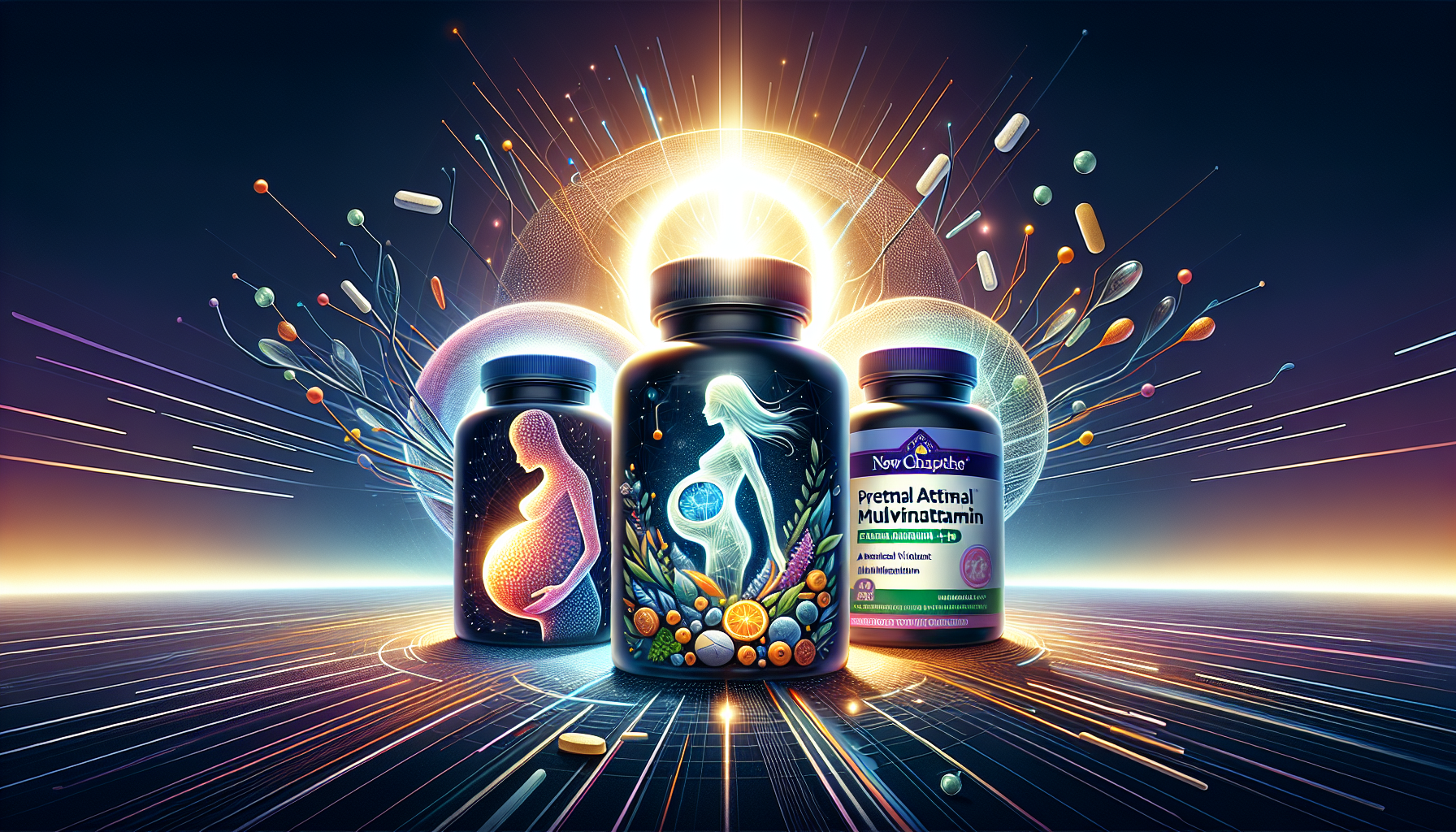
Several prenatal vitamins have distinguished themselves due to their remarkable quality and effectiveness. These top recommended prenatal vitamins include:
- Nature Made Prenatal Multivitamin Folic Acid + DHA
- Vitafusion Prenatal Supplement Gummy Vitamins
- OLLY Ultra Strength Prenatal Multivitamin
- Nordic Naturals Prenatal DHA
- THORNE Basic Prenatal Supplement (w/o DHA)
Each of these supplements offers unique benefits to support a healthy pregnancy.
Nature Made Prenatal Multivitamin Folic Acid + DHA
Nature Made Prenatal Multivitamin Folic Acid + DHA is highly recommended for expecting mothers due to its comprehensive nutrient profile. It contains essential nutrients like folic acid, DHA, and iron, crucial for a healthy pregnancy. This supplement supports maternal health and fetal development by providing necessary vitamins and minerals in easy-to-swallow softgels free from artificial flavors, synthetic dyes, and gluten.
Vitafusion Prenatal Supplement Gummy Vitamins
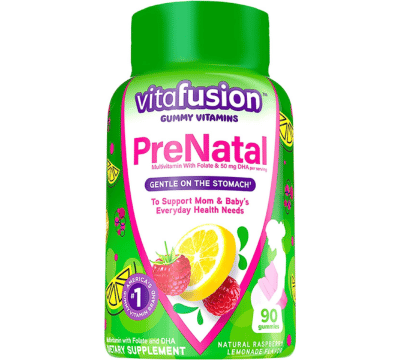
Pregnancy Vitamins for Women, With Folate and DHA, America’s Number 1 Gummy Vitamin Brand
Vitafusion Prenatal Supplement offers a convenient gummy form, making it an excellent choice for those with difficulty swallowing pills. Each serving includes essential nutrients like folic acid, DHA, and vitamins A, C, D, and E. It is free from high fructose corn syrup, artificial sweeteners, gluten, and dairy, ensuring it meets various dietary needs.
This makes it a user-friendly option, especially for pregnant women facing nausea or other issues.
OLLY Ultra Strength Prenatal Multivitamin
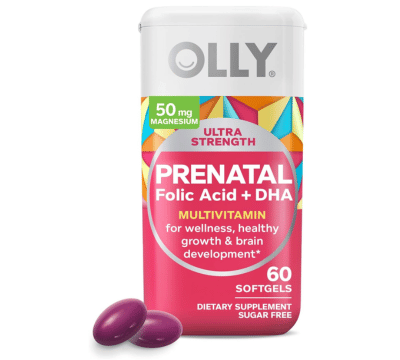
Supports Healthy Growth & Brain Development with Iron, Folic Acid, DHA, Vitamins C, & E
OLLY Ultra Strength Prenatal Multivitamin Softgels provide essential nutrients to support overall wellness and a healthy pregnancy. These premium softgels include folic acid to aid your baby's growth and development, and DHA, an essential fatty acid crucial for healthy brain and eye development. With added vitamins C and E, these softgels help maintain maternal health throughout pregnancy. Easy to swallow and naturally colored, they come with a hint of mint and lemon scent, ensuring a pleasant experience without added sugar. Packaged conveniently, OLLY Ultra Strength Prenatal Multivitamin Softgels are designed to meet the nutritional needs of both mom and baby.
Nordic Naturals Prenatal DHA
Nordic Naturals Prenatal DHA is an excellent supplement for ensuring high DHA content, crucial for the baby’s brain development and overall pregnancy health. However, it is not a full-spectrum prenatal vitamin and should be taken alongside a multivitamin to meet all nutritional needs.
THORNE Basic Prenatal Supplement (w/o DHA)
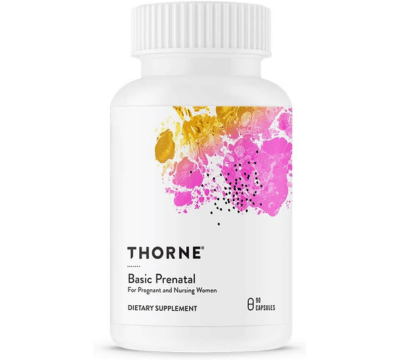
Well-researched Folate Multi for Pregnant and Nursing Women includes 18 Vitamins and Minerals, plus Choline.
THORNE Basic Prenatal Supplement is designed to support both mom and baby during pre-conception, pregnancy, and nursing, providing essential nutrients without unnecessary additives. This prenatal vitamin includes folate, choline, and 18 other vital nutrients to optimize health. With 5-MTHF, the bioactive form of folate, it ensures optimal absorption, especially for women with genetic factors affecting folate intake. Additionally, it contains gentle and effective nutrients like vitamins C, B6, and K, which can help alleviate morning sickness. Including 110 mg of choline per serving, supporting fetal brain and neurological development, and making THORNE Basic Prenatal a comprehensive choice for maternal and fetal health.
Wrapping Up Our Discussion
Ensuring a healthy pregnancy involves understanding and incorporating essential nutrients through the best supplement for pregnancy and a balanced diet. Prenatal vitamins support maternal and fetal health by providing folic acid, vitamin D, iron, and omega-3 fatty acids. These nutrients prevent neural tube defects, promote a baby's brain development, and maintain maternal and fetal health. Pregnant women should start taking prenatal vitamins early, ensuring they include a variety of vitamins and minerals such as vitamin C, vitamin E, and vitamin B. Incorporating green leafy vegetables, fatty fish, and other nutrient-rich foods can further enhance the healthy diet necessary for pregnancy.
A holistic approach to managing prenatal health involves choosing the right supplement form, whether prenatal multivitamins, gummy vitamins, or individual dietary supplements. Understanding when to use multivitamins versus individual supplements to address specific nutritional gaps. That is why consulting a healthcare provider for personalized supplement plans and regular monitoring ensures that pregnant women receive all the necessary nutrients for a healthy pregnancy. By making informed decisions and focusing on a comprehensive approach that includes prenatal vitamins, additional supplements, and a balanced diet, you can support a joyful and healthy pregnancy journey, benefiting both mother and baby.
Brief Answers to a Few FAQs
Why is folic acid important during pregnancy?
Folic acid is important during pregnancy because it helps prevent neural tube defects and supports DNA synthesis and red blood cell production. It is crucial for the healthy development of the baby.
Can I take gummy prenatal vitamins instead of tablets?
Yes, gummy prenatal vitamins are a good alternative to tablets, but may lack certain essential minerals. It's always best to consult with your healthcare provider for personalized advice.
What should I look for in a prenatal vitamin?
You should look for prenatal vitamins with key ingredients like folic acid, iron, DHA, calcium, and vitamin D. Make sure they are manufactured in a GMP-certified facility for quality assurance.
Are all dietary supplements safe during pregnancy?
No, not all dietary supplements are safe during pregnancy. Always consult your healthcare provider before taking any new supplements to ensure your and your baby's safety.
How can I ensure I take my prenatal vitamins correctly?
To ensure you take your prenatal vitamins correctly, take them on an empty stomach with a full glass of water and avoid consuming certain foods or beverages within 2 hours to enhance absorption.
Thank you for joining us in this discussion of the best supplements for pregnancy. If you want to add to your library of knowledge and are interested in diving deeper into some of the supplements mentioned in this article, you should check out the links above. It could be a huge time-saver - you won't be sorry you took a look.
And remember to check back with us often for information on many other natural supplements and vitamins!
*We are not qualified medical advisors. The content here is only based on our personal opinions, and research should NOT be used as a substitute for a healthcare professional's advice!
**This site contains affiliate links. We may earn a small commission through links in this post.






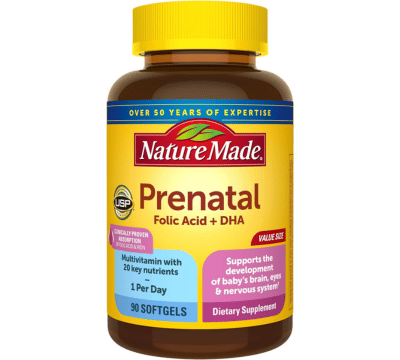
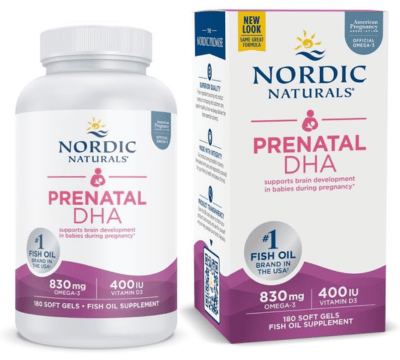





Member discussion